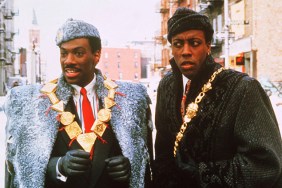Although there has been a lot controversy at this year’s Academy Awards about the lack of nominees of color, there is still a notable amount of diversity when it comes to sexuality. In nominee The Danish Girl, Eddie Redmayne plays a man who comes to realize that he is, in fact, a woman trapped in a man’s body. Todd Haynes’ Carol is a romance between two women, both of whom were nominated for acting awards. Some have even seen Inside Out as a polemic on transsexuality or bisexuality, because the protagonist has both male and female emotions in her head, and all the other characters have emotions that are uniformly gendered.
The Academy has famously honored numerous LGBT films over the years, and many actors have been nominated, and many have won, Best Actor or Best Actress for their portrayal of LGBT characters. Despite a noticeable lack of racial diversity in recent years, the last decade of recognized LGBT films has reflected an enormous sea change in the rights, the visibility, and the acceptance of LGBT people.
Also: #OscarsSoWhite | Academy Award-Worthy Actors of Color from 2015
This is not to say the Academy has always gotten it right. For many years, queer films were often ignored or snubbed by the Academy, and several truly great and historically significant LGBT films have escaped their attention.
Crave is here to reflect on the history of honorifics and oversights committed by the Academy.
The Recognized
Dog Day Afternoon (1976)

Warner Bros.
One of the standout films of the 1970s – perhaps the greatest era for American film – Sidney Lumet’s Dog Day Afternoon won an Oscar for Best Screenplay, and was nominated for Best Picture, Best Editing, Best Actor, Best Supporting Actor, and Best Director. It’s about a man who robs a bank in order to get money for his boyfriend who seeks a sex change. The best thing about Dog Day Afternoon is how casually Pacino’s sexuality is mentioned.
Brokeback Mountain (2005)

Focus Features
Ang Lee’s soulful and moving drama about the romance between two cowboys that lasted in secret for many years was one of the best films of 2005, and it earned eight Oscar nominations, winning three (for Directing, Writing, and Score). That it lost to the preachy and dumb Crash is, to this day, considered an injustice.
Philadelphia (1993)

TriStar
Tom Hanks was, until this film, commonly seen as a comedian. With Philadelphia, he won his first Oscar. The film was about a gay lawyer who is fired because he has AIDS. When he takes his case to the law, it’s revealed that he may have been fired for his sexuality instead. This was one of the first major Hollywood releases in my lifetime that so openly dealt with gay characters.
Transamerica (2005)

The Weinstein Company
A pre-op trans woman learns that she, as a male, fathered a son, now a teenage runaway. She must now step up and be the parent she never was. Felicity Huffman, a cis actress, managed to play the lead trans woman character so well that she fooled some audience members – I remember hearing audiences question what gender she actually was. She was nominated for an Academy Award.
Boys Don’t Cry (1999)

Fox Searchlight
Brandon Teena was a real-life trans boy who was tragically murdered by local men in Nebraska. In Boys Don’t Cry, Hilary Swank breathes life into Brandon, giving him a gentle, romantic soul. This was the first trans character to be so recognized by the Academy, and Swank won an Oscar. Her co-star, Chloë Sevigny, was also nominated.
The Kids Are All Right (2010)

Focus Features
This story of a married lesbian couple whose teen children seek out their biological father was nominated for four Oscars. The film also ultimately argues that the lesbian marriage is stronger for the kids, flying in the face of an old, out-dated conservative argument about gay parents. The Kids Are All Right was nominated for Best Picture.
The Hours (2002)

Paramount
Although the film is ultimately about suicide, The Hours is also a film about three generations of women whose lives are effected by Virginia Woolf’s Mrs. Dalloway. Two of the three women are gay or bisexual, and the third has a gay male friend. The Hours was nominated for nine Oscars, and won for Best Actress.
Milk (2008)

Focus Features
Director Gus Van Sant has done more creative films about gay characters, so it’s ironic that his Milk, one of his safest and cleanest, should be recognized by the Academy. Milk tells the story of Harvey Milk, America’s first openly gay elected official, played by Sean Penn. Penn won an Academy Award, as did the film’s screenwriter. It was nominated in seven other categories.
The Unrecognized
Blue is the Warmest Color (2013)

IFC
Abdellatif Kechiche’s film was a careful tale of sexual discovery, intense love, hot sex, awkward life-blending, vocational clashes, relationship boredom, and painful splitting, all between two young women in France. Due to an oblique rule about release dates, however, the film was declared ineligible for Best Foreign Film. Perhaps, were it eligible, it would have received more attention and the awards it deserved.
Mysterious Skin (2004)

Tartan
Gregg Araki’s most emotionally complex film sought to dispel certain myths about the link between childhood molestation and sexuality. The hero, at age 8, is already sexual, already attracted to older men, and already gay. He is then victimized by an older man, and we see the toll that takes on him. The NC-17-rated film is frank and forthright, and the performances are great. It didn’t even come close to an Oscar.
The Bitter Tears of Petra Von Kant (1972) and Fox and His Friends (1975)

New Yorker Films
Rainer Werner Fassbinder is one of the masters of world cinema, and his extensive filmography is daunting (44 films in 14 years). Two of Fassbinder’s greatest films (and he has several indispensable classics) deal with queer relationships. In Bitter Tears, an older women mistreats her younger lovers. In Fox, class breaks down in the face of the gay community, sometimes with tragic consequences. Neither film was recognized by the Academy, and Fassbinder himself has never been recognized.
Bound (1996)

Gramercy Pictures
Wachowski Starship’s debut feature is still well loved by those who have seen it, and is begrudgingly accepted by those who have come to hate the duo’s later films. In this shady neo-noir, two women fall in love and plot against an evil husband. Gina Gershon and Jennifer Tilly give career-best performances, and the screenplay is awesome. No Oscars, though.
Scorpio Rising (1964)

Fantoma
Kenneth Anger’s abstract, experimental musing on gay biker iconography isn’t exactly the type of short film that gets Oscar nominations, and that was doubly true in 1964. Today, Scorpio Rising is considered one of the most important queer films in cinema history. At the time, no one at the Academy noticed.
Happy Together (1997)

Kino
Wong Kar-Wai’s intense gay romance is gorgeous, wrenching, and unflinching. The men love each other passionately, and their relationship is tested by extended departures and reunions. The 1990s saw an explosion of queer cinema, and this was one of the better films from that era. But it wasn’t seen by the Academy as one of the better foreign films that year.
Victim (1961)

Rank Film Distribution
It’s surprising how few people talk about Basil Dearden’s Victim, one of the earliest films to openly discuss homosexuality. In it, a gay lawyer is blackmailed because of his sexuality, and is eventually outed. It’s a strong and complex drama with great writing and acting, and yet it goes unacknowledged to this day by Academy voters and almost everyone else.
Top Image: Focus Features
Witney Seibold is a contributor to the CraveOnline Film Channel, and the co-host of The B-Movies Podcast. He also contributes to Legion of Leia and to Blumhouse. You can follow him on “The Twitter” at @WitneySeibold, where he is slowly losing his mind.
Slideshow | 14 Times Oscar Buzz Eclipsed the Movies
14 Times The Oscar Buzz Eclipsed The Movies
-
Argo

In 2012, Argo did indeed win the Academy Award for Best Picture, despite the fact that the film's director, Ben Affleck, was not nominated for Best Director. It's been a long-held truth of the Oscars that the "real" Best Picture nominees are the ones that share Best Director nominations. In the case of Argo, all the stories were about Affleck's infamous which made a win for Argo seem like a sure thing.
Photo: Warner Bros.
-
Good Will Hunting

While Gus Van Sant's Good Will Hunting, one of the more notable indie dramas to emerge during the indie boom of the 1990s, was often lauded by critics, not a review would slide past without a vocal reminder that the screenplay was written by the film's two young stars, Ben Affleck and Matt Damon. A screenplay by actors? Preposterous! And young ones at that? What what what? When the two actually won the Oscar, every aspiring young actor took to their typewriters immediately.
Photo: Miramax
-
The Lord of the Rings: Return of the King

The first three films in Peter Jackson's Lord of the Rings series were nominated for Best Picture, but it seemed unlikely that any of them would win; It was clear that Hollywood was merely patting the series on the back, congratulating their ambition, rather than praising their storytelling acumen. When the third film rolled around, every thinkpiece began referring that year's Academy Awards as the LAST CHANCE to give an award to this series (which was loved by audiences). Perhaps the thinkpieces worked. Lord of the Rings: Return of the King won 11 Oscars. Dang.
Photo: New Line Cinema
-
Selma

Wow! Selma had a great song, didn't it? It's a good thing it did, because that was only one of two Oscars it was nominated for. No acting nominations, no directing nominations, no writing nominations. Just Best Picture and Best Song. This was a gross oversight in the eyes of many, and spawned accusations of racism in the Academy (it's a big part of where #OscarsSoWhite came from). The snub of Selma is all many people can mention know about the film. Is it good? I heard it was...
Photo: Paramount
-
The Crying Game

Neil Jordan's The Crying Game had a big, big secret. The ad campaign surrounding the film encouraged audiences to keep that secret. This was before the word "spoiler" was used as commonly as it is today. But when Jaye Davidson was nominated in the Best Supporting Actor category, it essentially ruined the surprise for everyone. Thanks a lot, Academy, you blew the surprise. While The Crying Game is a decent film, its secret - and the exposure thereof - is still more talked about.
Photo: Miramax
-
The Killing Fields

Roland Joffé's 1984 Oscar winner is a hefty and all-too-real drama about the genocide in Cambodia in the early 1970s. While you may find reviews here and there, the one detail that is always mentioned first is that Dr. Haing S. Ngor, who won an Academy Award for Best Supporting Actor, was a non-professional actor who could claim the most chilling form of authenticity: Ngor actually lived through Pol Pot's oppressive regime where he bore witness to innumerable atrocities.
Photo: Warner Bros.
-
Boyhood

Richard Linklater's Best Picture nominee (and winner for Best Supporting Actress) is a moving and realistic and conversational drama about 12 years in the lives of an average Texan family. Did you know that the film took twelve years to shoot? You do know this because that's all anyone talked about when the film was released. The extended shooting schedule designed to watch people grow is not new – watch the Up series sometime – but it was considered novel at the time, and it's all anyone could talk about. It turns out, it's also a good movie.
Photo: IFC Films
-
Syriana

Before Syriana was released, I began hearing odd stories of production troubles. Most notably, recognizable star George Clooney worked himself so hard that he collapsed from exhaustion. The one odd detail I heard repeated through the press at the time was that Clooney began leaking spinal fluid out of his nose, a symptom of extreme exhaustion that I was not familiar with. It may have been worth it, as Clooney ended up winning the Oscar for Best Supporting Actor.
Photo: Warner Bros.
-
Apocalypse Now

The bottomlessly acclaimed surreal war epic from Francis Ford Coppola was, prior to its release, the subject of a media firestorm. The film, which was shot in the jungles of the Philippines, housed a notoriously long production, and the budget was reported to balloon out of control. It was seen as a potential disaster for the studio, and its famously bloated production was the center of the conversation. Part of what makes the greatness of Apocalypse Now so towering is that it managed to remain in the public consciousness beyond its production woes. It was nominated for 8 Oscars (including Best Picture) and won two (for sound design and cinematography).
Photo: United Artists
-
Cleopatra

The 1963 production of Cleopatra is still better known – even to this day – for its lavish and overwrought production than it is for its story or performances. The film was, at the time, the most expensive production in Hollywood history, and it remains the longest studio picture ever made (it runs 248 minutes). Liz Taylor also wore more costumes than any other actress in any other film – a fact noted by The Guinness Book of World Records. And there was the well-publicized debacle of the giant litter they had to rebuild when production staff realized it wouldn't fit through the archway they built for it. The film is indeed overwrought, although that kind of lavishness can be a delight in itself. Cleopatra was nominated for 9 Oscars (including Best Picture) and won 4.
Photo: 20th Century Fox
-
Dersu Uzala

Akira Kurosawa is one of the great masters of cinema, so all film school students know about the comeback of Dersu Uzala. In 1970, Kurosawa made a film called Dodes'ka-den, which was his first color film, but also his biggest flop. Indeed, the failure of Dodes'ka-den was so damning to the maestro that he was thrown into a deep depression and even attempted sucide. How does one return to film after that? Why, with a lavish color production shot on 70mm film, shot entirely outdoors, with an all-Russian cast. Dersu Uzala saved Kurosawa. Ask a film student about Dersu Uzala, and few will note how great it is (although it is great, and it won the 1976 Oscar for Best Foreign Langauge Film). All of them, however, will recount the above story.
Photo: New World Pictures
-
The Wrestler

Another comeback story hangs over Darren Aronofsky's The Wrestler. There was a time when Mickey Rourke was a dashing young sex symbol of 1980s Hollywood. He was handsome, sexual, and talented. Then he flamed out, burnt by the Hollywood machine. He returned to his original profession of boxing where his face was pummeled beyond recognition. The return of Mickey Rourke was the biggest story of the year, and The Wrestler would still be notable for that reason, even if no one saw it. The film ended up, luckily, receiving overwhelming acclaim, and Rourke was nominated for an Oscar. He lost to Sean Penn in Milk.
Photo: Fox Searchlight
-
The Dark Knight

Christopher Nolan's The Dark Knight was, if the shroud of publicity was to be trusted, the Best Movie of All Time in 2008. I think more ink was spilled in service of Batman than any other figure that year. The loudest clamor came for the off-kilter performance of Heath Ledger as The Joker. Several months before the film was released, however, Ledger died of a drug overdose. While Ledger's performance is terrifying and impressive, the fact that it was posthumous allowed The Dark Knight to grow and become embellished by tragedy. Heath Ledger won an Academy Award for his performance.
Photo: Warner Bros
-
Blue Sky

I saw Blue Sky, and I only remember two things about it: Jessica Lange's Oscar-winning performance as the dotty, alcoholic wife of a nuclear engineer, and the fact that the film sat on a shelf for three years. I don't recall the film much, but I recall this interesting backstory vividly from 1994. Blue Sky was put on a shelf in 1991 following the bankruptcy of Orion Pictures. It was finally released after the director had died. The Academy gave an award to Lange, and every conversation thereafter was one of “thank goodness it was finally released!”
Photo: MGM








